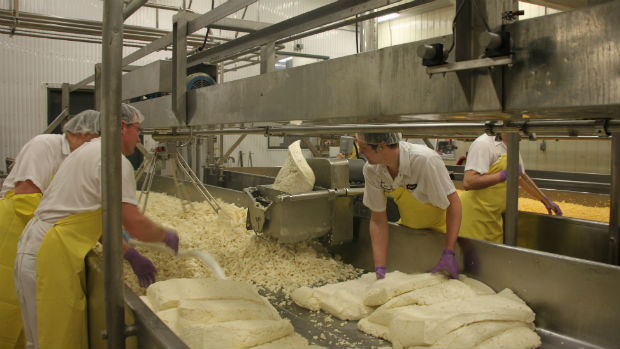A Comprehensive Overview to Cheese Production: Actions, Challenges, and High Quality Control Procedures
Cheese production is a complex process that calls for precise interest to information, from the first selection of premium milk to the lasts of manufacturing. Recognizing the essential steps involved, in addition to the numerous obstacles that can arise, is essential for preserving constant high quality and safety and security. In addition, implementing effective quality control measures is crucial in a sector that encounters raising analysis. As we examine these aspects, it becomes clear that the future of cheese production will certainly be formed by progressing patterns and technologies that could redefine typical techniques.

Review of Cheese Production
Cheese manufacturing is a complicated procedure that changes raw milk into a diverse array of dairy products, each with distinct tastes and appearances. The journey begins with the option of top quality milk, which can come from different sources, consisting of cows, goats, and lamb. The make-up of the milk-- fat content, protein levels, and the presence of particular societies-- plays a critical function in the last item.
The procedure typically involves several stages, including pasteurization, where damaging germs are gotten rid of, and the enhancement of starter cultures and rennet, which assist in milk coagulation. Once coagulated, the curds are separated from the whey, and the curds undergo various treatments, consisting of cutting, food preparation, and pushing, which dramatically affect the cheese's attributes.
In addition, variables such as aging problems, moisture, and temperature can considerably modify the taste profile and texture of the cheese. The art of cheese production depends heavily on the cheesemaker's competence, as they need to balance science and creativity to generate high-grade cheese. Recognizing these foundational aspects is essential for valuing the complex nature of cheese manufacturing and the broad spectrum of cheeses readily available in the marketplace today.

Key Actions In Production
The cheese manufacturing procedure involves a number of key actions that collectively transform raw milk right into an ended up product. Originally, the procedure begins with milk collection and quality analysis, ensuring that the raw material satisfies the needed standards for cheesemaking. Following this, the milk is sterilized to remove harmful germs, improving the safety and security of the final product.
Next, particular starter societies are included to the sterilized milk, promoting the fermentation procedure. These cultures transform lactose into lactic acid, which helps in curd formation. Consequently, rennet is presented to coagulate the milk, leading to the splitting up of curds and whey. The curds are after that reduced and prepared, enabling them to launch even more whey.
As soon as the wanted appearance is attained, the curds are drained pipes and pushed into molds, shaping celebrity. Salting is an important step, adding to taste, conservation, and wetness control. Later, the cheese may undertake aging or ripening, throughout you can try here which tastes and structures develop further. Finally, the ended up cheese is packaged for circulation. Each of these steps is crucial in making certain the top quality and attributes of the cheese produced.
Typical Challenges Encountered
While the cheese production process is thoroughly designed, different challenges can occur that impact both manufacturing effectiveness and item quality. One widespread obstacle is fluctuations in raw product top quality, particularly milk.
Another considerable obstacle is maintaining ideal fermentation problems. Temperature level and moisture fluctuations during aging can cause unwanted microbial development, affecting flavor profiles and cheese security. Additionally, staffing issues, including a lack of proficient labor, can prevent procedures and lead to errors in production processes.
Equipment maintenance is also crucial; break downs can interrupt workflows, resulting in production delays and increased prices. Regulative compliance presents its very own collection of difficulties, as makers should adhere to rigorous food safety and security criteria, which can vary by region. Browsing these challenges needs a proactive you could try these out approach, including complete training, routine equipment checks, and solid distributor connections to guarantee a consistent and top notch cheese outcome.
Quality Assurance Strategies
Making certain product consistency and security relies greatly on efficient quality control strategies throughout the cheese production process. These techniques include different phases, from basic material selection to end product examination.
One essential facet is the tracking of milk top quality, which includes screening for microbial contamination, somatic cell counts, and antibiotic deposits. Executing rigorous provider analyses guarantees that just premium milk is made use of, laying a solid structure for the cheese-making procedure.
During manufacturing, critical control points (CCPs) have to be identified and kept an eye on. This includes temperature control throughout pasteurization and fermentation, along with pH monitoring throughout curd formation - cheese store try this melbourne. Normal sampling and analysis of whey and curds can assist detect discrepancies from wanted criteria early
Post-production, sensory assessments, chemical analyses, and microbiological screening are important to confirm that the end product satisfies well-known quality requirements. Product packaging and storage space problems additionally require close oversight to avoid wasting and contamination.
Including a durable top quality monitoring system, including documentation and traceability, supports compliance with food safety policies. By embracing these thorough top quality control strategies, cheese manufacturers can significantly enhance product quality and consumer trust.
Future Trends in Cheesemaking
As celebrity production landscape advances, cutting-edge techniques and modern technologies are forming the future of cheesemaking. One significant fad is the increasing use automation and expert system (AI) in manufacturing procedures. These innovations improve efficiency, minimize labor costs, and allow for better accuracy in cheese formula and aging, resulting in regular quality and flavor accounts.
Sustainability is one more vital focus, with cheesemakers adopting eco pleasant practices, such as sourcing milk from local ranches, using renewable resource sources, and implementing waste decrease methods. This change not only interest eco aware consumers yet likewise addresses regulatory stress for sustainable practices.
Additionally, the demand for artisanal and specialized cheeses continues to climb, triggering producers to explore unique taste combinations and ingenious aging techniques. This fad is complemented by the expanding interest in plant-based and non-dairy cheese choices, driven by dietary choices and health factors to consider.
Additionally, improvements in technology assist in enhanced traceability, allowing customers to better recognize the origin and manufacturing methods of their cheese. As these patterns unravel, the cheesemaking industry is positioned to welcome a future defined by technology, sustainability, and a commitment to high quality.
Final Thought
In recap, cheese production includes a complicated interplay of processes, obstacles, and high quality control actions that are critical for producing varied cheese selections. The choice of high-quality milk, adherence to pasteurization standards, and precise fermentation conditions are necessary for making certain product safety and consistency. Dealing with existing challenges, such as labor lacks and equipment maintenance, alongside embracing future trends in automation and sustainability, will considerably enhance the cheese industry's ability to fulfill progressing customer needs and preserve high requirements.